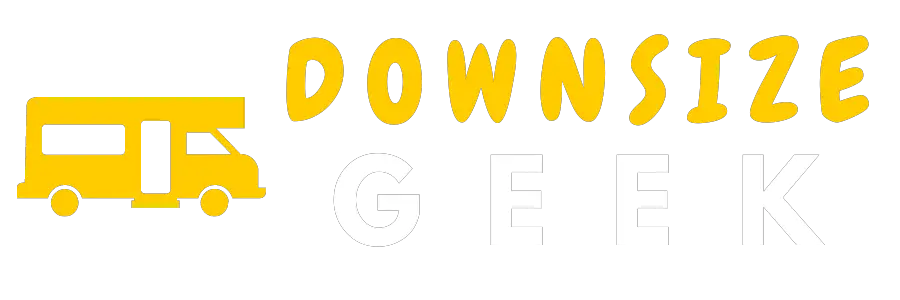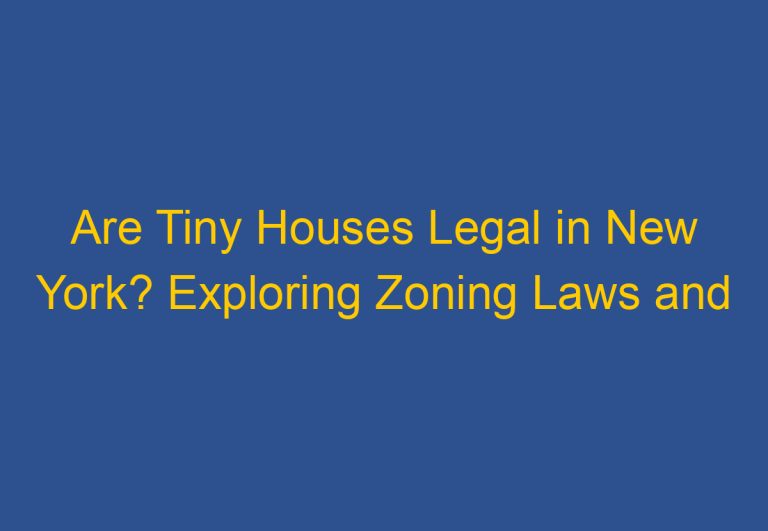Are Tiny Houses Legal in Washington? A Clear and Confident Answer
Tiny houses have been gaining popularity in recent years due to their affordability and minimalistic lifestyle. However, many people are left wondering whether tiny houses are legal in Washington State. The answer is not a straightforward yes or no, as there are regulations and codes that must be followed.
Washington State has adopted Appendix Q Tiny Houses, which relates to tiny homes on a foundation. Tiny House Bill 5383, which became effective on July 28th, 2019, mandates that the building code council write building codes for tiny homes. Additionally, the state prohibits cities or towns from preventing the use of movable tiny homes as primary residences in manufactured or mobile home communities. However, local jurisdictions set their own codes and regulations, which may vary from town to town.
It is important to note that tiny houses with a foundation are more likely to be legal in Washington State than tiny houses on wheels. A tiny house with a foundation is a dwelling that may be built on a foundation and is no larger than 400 square feet, including a kitchen, bathroom, and sleeping/living area, and must be built to the Washington State Building Code. On the other hand, a tiny house on wheels must meet the State Building Code requirements and is considered a licensed legal vehicle, meaning it cannot be over 8′-6″ wide or 14′ in height when in travel mode.
Legal Framework for Tiny Houses in Washington State
Washington State Building Code and Appendix Q
The Washington State Building Code is the primary legal framework for tiny houses in the state. Appendix Q, which was adopted in July 2021, provides specific building codes for tiny houses on a foundation. These codes cover everything from ceiling height to stairs and safety requirements. Tiny houses that meet these codes are considered legal dwellings in Washington State.
Zoning Regulations and Local Building Department Requirements
While the Washington State Building Code provides the overarching legal framework for tiny houses, local zoning regulations and building department requirements also play a role in determining the legality of tiny houses in specific areas. For example, King County requires that tiny houses have a foundation, while other jurisdictions may allow tiny houses on wheels. It is important to research local regulations before building or placing a tiny house.
Tiny House Bill ESSB 5383
Tiny House Bill ESSB 5383, which became effective in July 2019, mandates that the building code council write building codes for tiny homes. The bill also supports movable tiny homes and prohibits cities or towns from preventing their use as primary residences in manufactured or mobile home communities. This bill provides additional legal support and protection for tiny house owners in Washington State.
Overall, while tiny houses are legal in Washington State, it is important to adhere to the Washington State Building Code and any local regulations and requirements. By doing so, individuals can ensure that their tiny house is legal and safe for habitation.
Living in a Tiny House in Washington
Living in a tiny house in Washington is a popular option for those looking to downsize, live sustainably, or save money. However, before moving into a tiny house, there are several important considerations to keep in mind.
Inspection and Approval Process
The inspection and approval process for a tiny house in Washington can vary depending on the location and type of tiny house. In general, tiny houses must meet the Washington State Building Code requirements and be inspected and approved by the local enforcement agency.
For those building a tiny house from scratch, it is important to obtain a tiny house plan approval and insignia request form from the Washington State Department of Labor and Industries. Additionally, notification to the local enforcement agency is required before construction begins.
Tiny House Communities and Locations
Tiny house communities and locations are becoming more common in Washington, especially in areas such as Seattle, King County, and Olympia. These communities often provide a supportive network of like-minded individuals and can offer amenities such as communal spaces and shared utilities.
However, it is important to note that not all tiny houses are allowed in all locations. For example, some areas may only allow park model or recreational vehicle tiny houses, while others may allow manufactured homes. It is important to research local zoning laws and regulations before choosing a location for a tiny house.
Utilities and Infrastructure Consideration
When living in a tiny house, it is important to consider utilities and infrastructure needs. This includes plumbing and electrical systems, as well as access to water and waste disposal.
For plumbing and electrical systems, it is important to obtain the necessary permits and inspections from the local enforcement agency and the Washington State Department of Labor and Industries. It may also be necessary to obtain an L&I electrical permit.
In terms of water and waste disposal, options may include connecting to city utilities or using alternative systems such as composting toilets and rainwater harvesting.
Overall, living in a tiny house in Washington can offer many benefits, but it is important to carefully consider all aspects of the lifestyle before making the move. Joining the Washington Tiny House Association can also provide valuable resources and support for those interested in tiny house living.
Frequently Asked Questions
Do zoning regulations in Washington state permit the placement of tiny houses?
Zoning regulations in Washington state vary depending on the jurisdiction. As a result, the regulations for tiny houses also vary. In general, tiny houses on wheels are not permitted as permanent dwellings in most areas. However, some jurisdictions allow tiny houses on foundations as accessory dwelling units (ADUs) or as primary residences. It is important to check with the local planning department to determine the specific zoning regulations in your area.
What are the building code requirements for tiny houses in Washington state?
Washington state has adopted Appendix Q of the International Residential Code, which provides specific building standards for tiny houses on foundations. The building code requirements for tiny houses on wheels vary depending on the jurisdiction. In general, tiny houses on wheels must comply with the same safety standards as recreational vehicles (RVs).
How does Skagit County regulate the use of tiny houses within its jurisdiction?
Skagit County allows tiny houses on foundations as ADUs or as primary residences in certain areas. The county has specific regulations for the placement, construction, and occupancy of tiny houses. It is important to check with the planning department to ensure compliance with the regulations.
Are there specific legal provisions for tiny houses on wheels in Washington state?
Washington state does not have specific legal provisions for tiny houses on wheels. However, some jurisdictions allow tiny houses on wheels as ADUs or as primary residences. It is important to check with the local planning department to determine the specific regulations in your area.
What are the minimum size and building standards for dwellings in Thurston County?
Thurston County requires dwellings to be at least 220 square feet in size and comply with the International Residential Code. The county allows tiny houses on foundations as ADUs or as primary residences in certain areas. It is important to check with the planning department to ensure compliance with the regulations.
How do Spokane County ordinances address the construction and habitation of tiny houses?
Spokane County allows tiny houses on foundations as ADUs or as primary residences in certain areas. The county has specific regulations for the placement, construction, and occupancy of tiny houses. It is important to check with the planning department to ensure compliance with the regulations.










